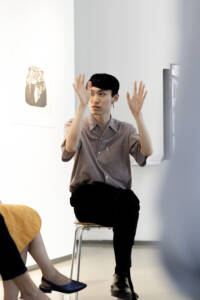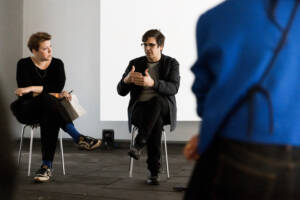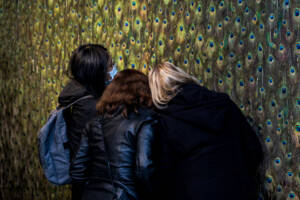
© the artist
For the Record
With Vivian Caccuri, Jace Clayton, Geraldine Juárez, Christine Sun Kim, Julio César Morales with Discos Unicornio
Curated by Bhavisha Panchia
Opening: 1.6.2018, 7pm
Exhibition: 2.6.–2.9.2018
Music is produced in specific cultural contexts and constitutes a fundamental basis for forming personal and collective identities. It symbolically connects us to places and cultures, helping to preserve histories of migrations and displacements of peoples across old empires, colonial regimes, and new global capitalist pursuits. It conjures narratives from distant pasts, resurrects lost voices and invents virtual futures. Musical works record the movement of bodies, fluctuating economies and the transpositions of knowledge. They are testament to acts of defiance and operate as tools to reconfigure spaces and systems.
The exhibition For the Record features artists who utilise music as a discursive site to articulate lived experiences and to question contemporary societal conditions under persisting colonial, imperial and capitalist enterprises.
Jace Clayton’s interdisciplinary project, Sufi Plug Ins, intervenes into the existing western bias of music production to make available different audio software based on nonwestern musical concepts. Geraldine Juárez’ work focuses on media technologies and their role in the construction of dominant epistemic and economic narratives. In the vinyl record Wealth Transfer she uses the pattern of stock market fluctuations as a musical waveform to highlight high frequency trading and the abstraction of global trade. Vivian Caccuri uses installation and performance to analyse the impact of sound on social and cultural formations; in Talking Machine she charts the emergence and trajectory of Brazil’s vinyl industry. Julio César Morales’ work investigates migration and underground economies, particularly responding to US/Mexico relations through music, video and installation, while Christine Sun Kim attends to the material relationship between sound and the everyday that share inherent ties to social experiences.
Following the words of Jacques Attali, music reflects the construction of society, and is a way of perceiving the world altogether. Yet listening to these musical registers involves the allocation of attention and awareness. For the Record turns to listening as an act of mindfulness: paying attention to neglected stories and experiences, while also creating spaces in which re-imagination can occur.

Bhavisha Panchia is a grant holder of the programme Curators in Residence of KfW Stiftung in cooperation with ifa (Institut für Auslandsbeziehungen). The programme offers promising emerging curators from Latin America, Africa, the Middle East and Asia the opportunity to spend three months in Berlin, thus promoting intercultural and discursive exchange in exhibition organisation. The residency’s purpose is to raise critical awareness of postcolonial discourses and encourage intellectual engagement with cultural heritage.
The exhibition is kindly supported by Clear Audio

Biographies
Vivian Caccuri uses sound as a vehicle to experiment across sensory perception, and with issues related to history and social conditioning. Through objects, installations and performances, her pieces create situations that disorient everyday experience and, by extension, disrupt meanings and narratives seemingly as ingrained as the cognitive structure itself. Caccuri has developed projects in many cities in Brazil and abroad, including the Amazon, Accra, Detroit, Helsinki, Vienna, Venice, Kiev and Valparaíso. Her sound works and compositions have been broadcast in various radio stations and her book Music is What I Make (2012) was awarded by Funarte Prize of Critical Production in Music in 2013.
Jace Clayton is an artist and writer based in Manhattan, also known for his work as DJ /rupture. Clayton uses an interdisciplinary approach to focus on how sound, memory and public space interact, with an emphasis on lowincome communities and the Global South. His book Uproot: Travels in 21st Century Music and Digital Culture was recently published by Farrar, Straus and Giroux, New York.
Geraldine Juárez is an artist working with sculptural objects and audiovisual media to address stories, histories and contexts of contemporary technics and economics. Solo and group exhibitions include The Dutch Savannah (De Domijnen, Sittard; 2018), University of Disaster (Bosnia and Herzegovina Pavilion, 57th Venice Biennale; 2017), Situations/Placeholder (Fotomuseum Winterthur; 2017), and Dreamlands: Immersive Cinema and Art, 1905–2016 (Whitney Museum of American Art, New York; 2016). Her writing has been published in continent., SCAPEGOAT: Architecture | Landscape | Political Economy and inIntercalations 3: Reverse Hallucinations from the Archipelago (K. Verlag, Berlin). She received an MFA in Fine Art from Valand Academy in Gothenburg, Sweden, where she has lived and worked since 2010.
Employing a range of media and visual strategies, artist, educator, and curator Julio César Morales explores issues of migration, underground economies and labour on personal and global scales. Morales works by whatever means necessary to explore social interaction and political perspectives, from watercolour drawings that diagram human trafficking, to music and installation that responds to transcontinental cultural flows. International exhibitions include the Lyon Biennial, Istanbul Biennial, LACMA, Singapore Biennial, Frankfurter Kunstverein and Prospect 3 New Orleans, to name a few. He has been curator of visual arts at the Arizona State University Art Museum since 2013.
Christine Sun Kim uses the medium of sound in performance and drawing to investigate her relationship with spoken languages and her aural environment. Selected exhibitions and performances have been held at White Space, Beijing (solo); Carroll/Fletcher, London (solo); De Appel, Amsterdam (solo); nyMusikk, Oslo; Sound Live Tokyo, Tokyo; Berlin Biennale; Shanghai Biennale; San Francisco Museum of Modern Art; Rubin Museum, New York; PS1, New York; and the Museum of Modern Art, New York. Kim was awarded TED and MIT Media Lab Fellowships.
Bhavisha Panchia is a curator and researcher within the field of visual and audio culture. Her interests are leveled at anti/decolonial practices, global South-North relations, production and circulation of (digital) media, tech-colonialism, including the politics of sound and music in relation to diasporic formations. She has curated the exhibitions Buried in the Mix (MEWO Kunsthalle Memmingen; 2017–18), what is left of what has left (CCS Bard, New York; 2016), and is the founder of Nothing to Commit Records (NTCR), a label and publishing platform committed to producing and expanding knowledge related to contemporary art, literature and music within and across the Global South.



